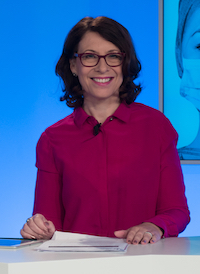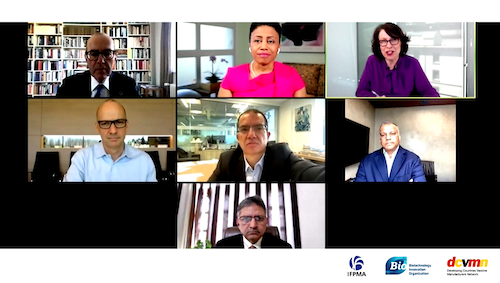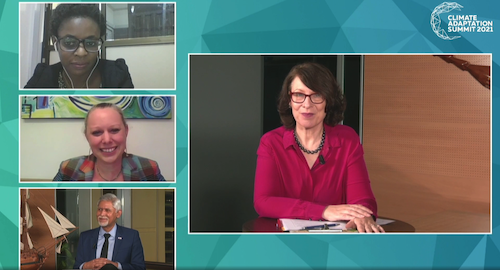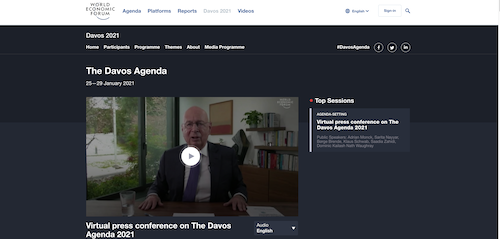
Claire Doole is a former BBC correspondent and international spokeswoman who is passionate about helping people communicate with confidence. Since 2006, she has successfully trained hundreds of professionals in the art of presenting and public speaking, talking to the media, managing communications in a crisis, and writing for the web. In addition, she has coached C-level executives and public figures to give powerful TEDx and TED style talks in Europe and the Middle East. A Swiss and UK national, Claire trains and coaches in French and English.
Claire is also a highly experienced moderator having facilitated panel discussions with government ministers, NGO activists, humanitarians and human rights specialists at major events.

By Claire Doole, Doole Communications
Have you seen the play, “Six Characters in search of an Author” by the Italian dramatist, Luigi Pirandello? Actors rehearsing for a play are interrupted by six unfinished characters in search of an author to finalise their story. It was first performed in 1921 and is part of the absurdist genre – breaking down the barriers between fantasy and reality.
Unfortunately, a century later, it is the absurd reality that many moderators can find themselves in when confronted with a cast of speakers selected by the organizers of an event. We struggle to work out why they have been chosen, and what they bring to the subject under discussion. We are then left to build connections between the speakers to create a narrative flow that makes sense to the audience.
Believe me, this can take hours of head scratching and sometimes the connections are just not there, particularly if an organiser has selected someone for non-editorial reasons such as an important donor, someone they want to do busines or engage with in the future or because we must have a representative from all five corners of the globe.
Start with the what and not the who
Organisers often tell me they want a BBC-style discussion. If that is the case, they need to follow the principles of BBC news and current affairs programmes. You start with identifying the news of the moment – for event organizers – this translates as what is top of mind and relevant for the audience.
A lot of events today are focusing on building back better after the pandemic, asking if the world can be more sustainable. The BBC would take an opposing view structure bringing someone from the government to explain how they set new environmental targets to achieve net-zero emissions, and then an environmental activist who says the targets are inadequate. The BBC might also put into the mix an academic who can give context.

By Claire Doole, Doole Communications
Organising a virtual press briefing is to coin the Thai-English phrase – “same same but different.”
The basics are the same. You need to have news, which is impactful, timely and ideally topical. It may seem obvious, but too often press briefings are organised solely to “educate” the media about an issue. I can’t tell you how many I have left as a BBC Foreign Correspondent without a story to broadcast!
But there are many differences; while virtual briefings have many advantages notably cost, convenience, geographic reach and you could argue carbon footprint, as with all digital events they need to better prepared and moderated.
For the past year I have been moderating virtual media briefings for the International Federation of Pharmaceutical Manufacturers Associations on COVID 19 – last week was my 6th – and also advising companies and organisations on how to run and speak at them.
Preparing a virtual press briefing
Based on my experience on both sides of the fence as a moderator/media consultant/trainer and former journalist, here are four key questions you should ask yourself:

By Claire Doole, Doole Communications
What is the biggest challenge when organising a virtual event? Technical glitches are high up on the list when I ask this question in my workshop on organising engaging virtual events.
A year on since the pandemic first hit, we are still challenged and aggravated by poor video and sound quality, speakers that fail to connect and lack of time management. At one event I moderated, so many outside lines went down I ended up talking at length to the one guest I fortunately had in the studio. If he hadn’t been with me, we would have just had to go on a break and come back once we reconnected with our speakers.
So, how do you organise a technically glitch free event?
Pre-recordings
I recently moderated the Global Vaccine Immunization and Research Forum (GVIRF) – an event spanning three days over two continents – where all the speakers were pre-recorded. They or proxies were brought back live to answer audience and moderator questions.
If you do pre-record, speakers must keep to time. If you are pre-recording a panel discussion or interview, it must be done “as live” so that it is kept to time. If you go over, you will have to cut something else later in the programme.
Broadcasters give themselves flexibility, editing short and longer versions.

By Claire Doole, Doole Communications
This week the powerful icons of business, finance and a spattering of civil society will not meet in the Swiss ski resort of Davos for the annual World Economic Forum’s flagship meeting. Instead, they will meet virtually for a meeting billed as the Davos Agenda which will focus on rebuilding trust and shape the principles, policies and partnerships needed for 2021.
I am hoping the virtual meeting will also showcase and shape best practice in terms of organising virtual events. Many companies and organisations have made the shift from physical to digital events – recognising that producing a successful event is like producing a TV programme. As I wrote in my September blog, they must be shorter, more varied, more creative, better moderated and rigorously rehearsed.
But since then, it has become even more obvious that organisers are going to have to up their game if they are to counter the increasing challenges of high attrition rates.
Let me share some anecdotal evidence. Organisers are not getting the numbers as “zoom fatigue” sets in and attendees zoom out. In some instances, there are just too many virtual events. One communications director from an international organisation told me they organised 67 webinars last year – sometimes up to three a week– and had to make sure staff took part to ensure strong numbers.
This year, faced with budget cuts, international organisations and NGOs are scrambling for relevance with donors, which means the pandemic of virtual events shows no sign of slowing. However, they systematically risk forgetting the well-known saying in communications that less is more.

photo courtesy of ERS
By Claire Doole, www.doolecommunications.com
Many of you are moderating events and panel discussions in the virtual world. If you are an in-house moderator, you have an advantage over someone like myself in that you automatically know the subject area. However, that doesn’t mean that you can “rock up and just have a conversation” in the words of someone I coached recently in how to moderate at a virtual event!
Professional moderators may make it look effortless as they seamlessly transition from one speaker, subject area or segment to another, but it takes a lot of preparation to work out the editorial narrative of an event and the flow of a specific panel discussion.
In many respects in the virtual world, it is even harder for two main reasons:
1) It is more challenging to capture and hold the audience’s attention and;
2) Organizers are packing their events with too many speakers.
If you want to overcome these challenges and be a dynamic virtual moderator, have a look at some of my tips below:
Work with the organisers on event design
I run workshops and act as a consultant to organisations and companies on how to design an entertaining, participatory and insightful event. As an in-house moderator, however, you are well placed to influence the narrative and flow of the event from the start.
- Make sure they have made the shift from the real to virtual world and apply the principles of a TV news programme, namely short, varied and creative.
- Advise on the format. Blocks of speakers who present one after each other is overwhelming and potentially tedious for the audience. I have seen programmes where nine speakers make keynote speeches, presentations or remarks with no audience or moderator intervention for the first hour. Even two keynote speeches of 20 minutes each back to back before the audience Q&A is asking a lot of the audience.
- Limit the number of speakers in a panel discussion to no more than four. I have turned down panel discussions where there are seven speakers as it is impossible to generate a lively discussion of views. It goes without saying that it is frustrating for the panelists to be given so little time to get their points across and can certainly lead to information overload for the audience.






